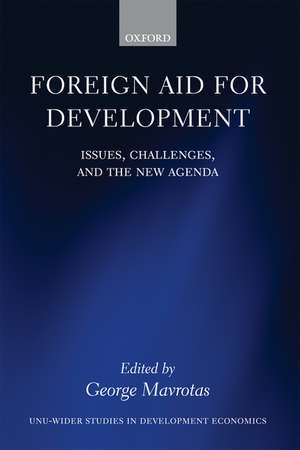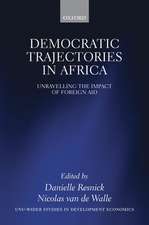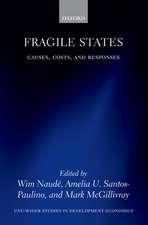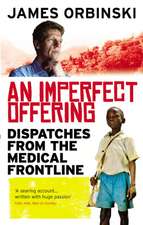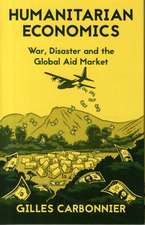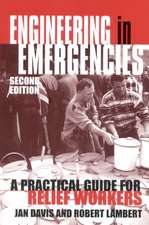Foreign Aid for Development: Issues, Challenges, and the New Agenda: WIDER Studies in Development Economics
Editat de George Mavrotasen Limba Engleză Hardback – 25 feb 2010
Din seria WIDER Studies in Development Economics
- 30%
 Preț: 504.17 lei
Preț: 504.17 lei - 26%
 Preț: 733.49 lei
Preț: 733.49 lei - 30%
 Preț: 597.88 lei
Preț: 597.88 lei - 17%
 Preț: 594.16 lei
Preț: 594.16 lei - 7%
 Preț: 159.68 lei
Preț: 159.68 lei - 13%
 Preț: 737.02 lei
Preț: 737.02 lei - 17%
 Preț: 583.39 lei
Preț: 583.39 lei - 28%
 Preț: 473.92 lei
Preț: 473.92 lei - 30%
 Preț: 501.49 lei
Preț: 501.49 lei - 30%
 Preț: 724.70 lei
Preț: 724.70 lei - 30%
 Preț: 748.64 lei
Preț: 748.64 lei - 31%
 Preț: 434.64 lei
Preț: 434.64 lei - 18%
 Preț: 333.97 lei
Preț: 333.97 lei - 34%
 Preț: 848.58 lei
Preț: 848.58 lei - 34%
 Preț: 848.33 lei
Preț: 848.33 lei - 34%
 Preț: 803.83 lei
Preț: 803.83 lei - 34%
 Preț: 954.23 lei
Preț: 954.23 lei - 34%
 Preț: 892.48 lei
Preț: 892.48 lei - 22%
 Preț: 188.78 lei
Preț: 188.78 lei - 30%
 Preț: 617.12 lei
Preț: 617.12 lei - 19%
 Preț: 333.48 lei
Preț: 333.48 lei - 27%
 Preț: 378.41 lei
Preț: 378.41 lei - 34%
 Preț: 1039.04 lei
Preț: 1039.04 lei - 34%
 Preț: 1043.37 lei
Preț: 1043.37 lei - 27%
 Preț: 329.58 lei
Preț: 329.58 lei - 34%
 Preț: 1291.62 lei
Preț: 1291.62 lei - 23%
 Preț: 1213.11 lei
Preț: 1213.11 lei - 34%
 Preț: 879.76 lei
Preț: 879.76 lei - 19%
 Preț: 652.65 lei
Preț: 652.65 lei - 34%
 Preț: 1039.69 lei
Preț: 1039.69 lei - 34%
 Preț: 892.84 lei
Preț: 892.84 lei - 27%
 Preț: 443.57 lei
Preț: 443.57 lei - 22%
 Preț: 526.33 lei
Preț: 526.33 lei - 30%
 Preț: 913.24 lei
Preț: 913.24 lei - 34%
 Preț: 998.62 lei
Preț: 998.62 lei - 31%
 Preț: 396.19 lei
Preț: 396.19 lei - 17%
 Preț: 413.16 lei
Preț: 413.16 lei - 34%
 Preț: 1188.77 lei
Preț: 1188.77 lei - 34%
 Preț: 817.30 lei
Preț: 817.30 lei - 30%
 Preț: 1012.76 lei
Preț: 1012.76 lei - 7%
 Preț: 360.77 lei
Preț: 360.77 lei - 31%
 Preț: 447.33 lei
Preț: 447.33 lei - 27%
 Preț: 1295.58 lei
Preț: 1295.58 lei - 31%
 Preț: 441.21 lei
Preț: 441.21 lei
Preț: 836.31 lei
Preț vechi: 1200.11 lei
-30% Nou
Puncte Express: 1254
Preț estimativ în valută:
160.03€ • 174.37$ • 134.85£
160.03€ • 174.37$ • 134.85£
Carte tipărită la comandă
Livrare economică 14-19 aprilie
Preluare comenzi: 021 569.72.76
Specificații
ISBN-13: 9780199580934
ISBN-10: 0199580936
Pagini: 394
Ilustrații: 27 Figure and 25 Tables
Dimensiuni: 163 x 241 x 28 mm
Greutate: 0.75 kg
Editura: OUP OXFORD
Colecția OUP Oxford
Seria WIDER Studies in Development Economics
Locul publicării:Oxford, United Kingdom
ISBN-10: 0199580936
Pagini: 394
Ilustrații: 27 Figure and 25 Tables
Dimensiuni: 163 x 241 x 28 mm
Greutate: 0.75 kg
Editura: OUP OXFORD
Colecția OUP Oxford
Seria WIDER Studies in Development Economics
Locul publicării:Oxford, United Kingdom
Recenzii
This important volume should be required reading for aid scholars and practitioners, and for the general reader interested in aid issues. The much discussed questions of whether aid is really effective, and in what ways, receive sophisticated and new analysis here. The editor is himself one of the leading researchers in the field. The debate has been going on a long time, but the questions and the answers have changed, and there are many new insights in this volume about what can and should be done to make aid a better instrument for serving the poor. If you want to know what today's aid debate is all about, this is where you will find the essential materials.
This is an important new contribution to the debate over the effectiveness of foreign aid. It brings together leading academics to assess the current state of the debate over aid. The chapters set forth the latest controversies over the problems associated with foreign aid, from the new selectivity criteria to aid's role in fragile and war torn states. In addition to elucidating the most recent scholarship on aid, the volume also contributes to policy makers' knowledge about aid effectiveness and its delivery. The final sections explore in detail various mechanisms for improving accountability and effective implementation of aid, especially in politically challenging environments. This book is a must have for academics and policy makers interested in the future of foreign assistance to the developing world.
This important collection of papers will provide much value-added for those already steeped in the aid literature. It will be a gold mine for students looking for supplementary materials. All will find it topical and stimulating. I hope it attracts the wide attention it deserves.
This book, edited by a leading expert in the field, brings together a number of essays written by leading figures in the analysis of foreign aid. The diverse nature of issues and views, and the depth of analysis, make it an essential reading for anyone interested in the welfare of the "bottom billion."
The glaring gaps in human development across countries of the world are among the reasons why the interest in foreign aid remains one of the most hotly debated topics in development discourse. On the eve of the final phase through the 2015 MDG targets, the debates are as live as ever. In a literature that is driven by ideological divides and constrained by empirical difficulties, this volume is a welcome and major step forward in helping to clarify what we know and the challenges ahead. The distinct focus on aspects of most interest to policy makers, like aid effectiveness, management and modalities, underlines its relevance and value to a broad audience of practitioners and students of development.
In recent years the old question 'does aid work?' has gained new interest as it has become linked to the debate on how to achieve the UN's Millennium Development Goals by 2015. Many will say more aid is needed, but there are questions about for instance the volatility of aid or the absorption capacity of recipient countries. The present volume brings together contributions from leading experts who discuss the state of the art in this area and contribute to emerging policy agendas. In doing so, they bring evidence that on the one hand there are inefficiencies in foreign aid for development but also that on the other hand there are possibilities to overcome such deficiencies. As such this book is a must-read for all those concerned with the enhancement of the effectiveness of aid.
The question of foreign aid has returned to center stage.The moralistic prescriptions that aid must be given simply as a duty, and the technocratic assertions that aid will necessarily lead to development, have been challenged by many in the receiving countries such as Dambisa Moyo, who raise the old issues of "absorptive capacity" and even claim that aid does harm. These debates are old but now have a new cogency. This book comes at the right time and is a refreshing contribution to this debate.
This is an important new contribution to the debate over the effectiveness of foreign aid. It brings together leading academics to assess the current state of the debate over aid. The chapters set forth the latest controversies over the problems associated with foreign aid, from the new selectivity criteria to aid's role in fragile and war torn states. In addition to elucidating the most recent scholarship on aid, the volume also contributes to policy makers' knowledge about aid effectiveness and its delivery. The final sections explore in detail various mechanisms for improving accountability and effective implementation of aid, especially in politically challenging environments. This book is a must have for academics and policy makers interested in the future of foreign assistance to the developing world.
This important collection of papers will provide much value-added for those already steeped in the aid literature. It will be a gold mine for students looking for supplementary materials. All will find it topical and stimulating. I hope it attracts the wide attention it deserves.
This book, edited by a leading expert in the field, brings together a number of essays written by leading figures in the analysis of foreign aid. The diverse nature of issues and views, and the depth of analysis, make it an essential reading for anyone interested in the welfare of the "bottom billion."
The glaring gaps in human development across countries of the world are among the reasons why the interest in foreign aid remains one of the most hotly debated topics in development discourse. On the eve of the final phase through the 2015 MDG targets, the debates are as live as ever. In a literature that is driven by ideological divides and constrained by empirical difficulties, this volume is a welcome and major step forward in helping to clarify what we know and the challenges ahead. The distinct focus on aspects of most interest to policy makers, like aid effectiveness, management and modalities, underlines its relevance and value to a broad audience of practitioners and students of development.
In recent years the old question 'does aid work?' has gained new interest as it has become linked to the debate on how to achieve the UN's Millennium Development Goals by 2015. Many will say more aid is needed, but there are questions about for instance the volatility of aid or the absorption capacity of recipient countries. The present volume brings together contributions from leading experts who discuss the state of the art in this area and contribute to emerging policy agendas. In doing so, they bring evidence that on the one hand there are inefficiencies in foreign aid for development but also that on the other hand there are possibilities to overcome such deficiencies. As such this book is a must-read for all those concerned with the enhancement of the effectiveness of aid.
The question of foreign aid has returned to center stage.The moralistic prescriptions that aid must be given simply as a duty, and the technocratic assertions that aid will necessarily lead to development, have been challenged by many in the receiving countries such as Dambisa Moyo, who raise the old issues of "absorptive capacity" and even claim that aid does harm. These debates are old but now have a new cogency. This book comes at the right time and is a refreshing contribution to this debate.
Notă biografică
George Mavrotas is the Chief Economist of the Global Development Network, formerly a Senior Fellow and Project Director at UNU-WIDER and, prior to that, in the Economics Faculties of the Universities of Oxford and Manchester, UK. He is also a Visiting Professor at CERDI, University of Auvergne in Clermont-Ferrand, France. He is the author and co-author of more than 100 publications on a broad range of development issues. His other books include Advancing Development (Palgrave Macmillan); Commodity Supply Management by Producing Countries (OUP); Domestic Resource Mobilization and Financial Development (Palgrave Macmillan); Financial Development, Institutions, Growth and Poverty Reduction (Palgrave Macmillan); Development Finance in the Global Economy (Palgrave Macmillan); Development Aid: A Fresh Look (Palgrave Macmillan) and Commodities, Governance and Economic Development Under Globalization (Palgrave Macmillan). He holds a PhD in Economics (DPhil) from Oxford.
